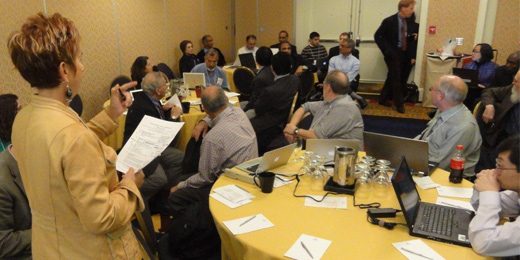New Community Report Defines Opportunities for Computer Science in Disaster Management
WASHINGTON, D.C., July 9, 2012
Late last month, the Computing Community Consortium (CCC) – an activity of the Computing Research Association (CRA) –released a report titled Computing for Disasters: A Report from the Community Workshop. The report was formulated following a two-day CCC visioning workshop held in late April in Washington, DC. The purpose of the workshop was to identify fundamental research challenges for individual computing disciplines, as well as crosscutting research questions requiring novel, multi-disciplinary solutions.
As workshop co-organizer Robin Murphy, the Raytheon Professor of Computer Science and Engineering and director of the Center for Robot-Assisted Search and Rescue at Texas A&M University, noted in an entry on the Computing Community Consortium Blog at the time of the report’s release:
The primary goal was to formalize what we individually were seeing that made computing research for disasters unique. We each saw that disasters were more than an application area, yet required significant understanding of the larger socio-technical system in order to conduct research with broad impacts.
Our process focused on creating a common ground between participants. We mixed in grounding case studies by practitioners such as Marc Haffer from CALFIRE and Matt Minson, MD, medical director of Texas Task Force One with short technical spotlights and breakouts. Perhaps the most moving moment was during our after hours tour of the Digital Emergency Operations Center at the headquarters of the American Red Cross, where one of the workers asked us the haunting question, “What would it take for there to be no more emergencies?”

Workshop participants described a vision for a robust, multi-disciplinary community in which researchers can partner with practitioners to tackle fundamental new research in socio-technical systems enabling decision making for extreme scales under extreme conditions. Indeed, they concluded that disasters pose four broad challenges for fundamental computer science research that are distinct from existing efforts and programmatic initiatives at the Federal level:
Simultaneous Extreme-Scale Challenges. Disaster computation must deal with challenge problems that occur at several exceptionally stressful scales simultaneously, including:
- Time: Disaster management encompasses preparedness and prevention (past), real-time response (present), and recovery (future). Events can be discrete and short lived, as in the case of a tornado, or long-term, as with climate change.
- Space: Damage can be highly localized, e.g., a bridge collapse, or spread over states, e.g., a hurricane or earthquake, while the economic impacts can be national or global.
- Stakeholders: Citizens, governments (municipal, county, state and federal), industry, and non-governmental organizations all have roles to play.
- Data: Data is heterogeneous, takes many forms and content, comes from different sources, arrives in different volumes at different times, and exhibits different priorities for different phases of the disaster.
Computational Complexity Exacerbated by Interdependencies. The disaster event, as well as the associated response, is one in which the behavior is non-linear and there exist large interdependencies between variables, multiple temporal and spatial scales, and no single optimal solution. This complexity propagates to algorithmic and data complexity and challenges in modeling chaotic systems. Other sources of computational complexity include the need for maintaining privacy and security of the data; the politics, sociology, psychology, and native language issues; and the impact of the resilience of the underlying electrical, communications, transportation, and financial infrastructure.
Human-System Integration in Adverse Environments. Computing for Disasters is about enhancing human capabilities in making decisions for extreme events that challenge comprehension under extreme situations during which decision makers are tired, dirty, and hungry; they may be working remotely and under dangerous, uncomfortable, demanding conditions that are physiologically and cognitively disrupting. Research is needed in sense making, comprehension, visualization, trustworthy data, decision support tools, and determining physiological and cognitive impacts.
A Different Style of Research. The manner in which research on Computing for Disasters is conducted is distinctive in at least three ways. Similar to the cross-cutting Smart Health and Wellbeing program at the National Science Foundation, which aims to tackle the myriad challenges of health care delivery within a large, expensive, and ever-evolving system, Computing for Disasters research is holistic and conducted almost solely in the context of the domain—and thus it is essential to have peer-partnerships with stakeholders. In addition, it relies primarily on empirical methodologies.
The full report can be accessed here. For more information, visit the workshop webpage here or a blog post summarizing the key findings contained within the report.
About the CCC: The Computing Community Consortium (CCC; http://cra.org/ccc) was established in fall 2006 under a Cooperative Agreement between the Computing Research Association (CRA) and the National Science Foundation (NSF). A standing committee of CRA, the CCC seeks to mobilize the computing research community to debate long-range challenges and build consensus around specific research visions. The CCC specifically pursues the next big computing ideas that will define the future of the field, attract the very best talent, and catalyze research investment and public support in the long term.
About the CRA: The Computing Research Association (CRA; http://cra.org/) was established 40 years ago and has members at more than 220 North American academic, industrial, and government research entities. Its mission is to strengthen research and advance education in computing fields, expand opportunities for women and minorities, and improve public and policymaker understanding of the importance of computing and computing research in society.
For more information: Contact Dr. Erwin Gianchandani, Director of the Computing Community Consortium & Computing Innovation Fellows Project: erwin@cra.org; 202-266-2936.

